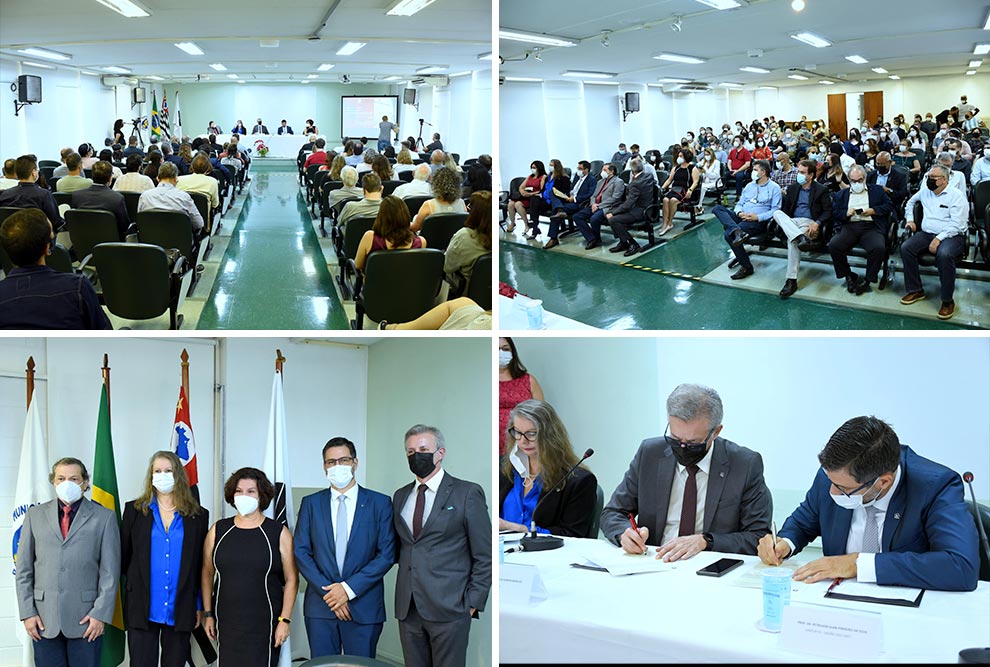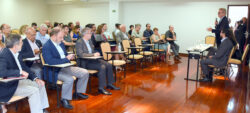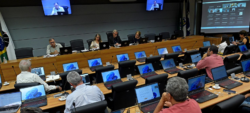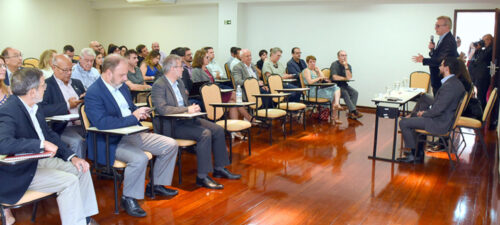This Monday (19th), Professor Petrilson Alan Pinheiro da Silva, from the Department of Applied Linguistics, took office as director of the Language Studies Institute (IEL) at Unicamp. He will assume office in January 2023 and will remain in charge of the institute until 2027. The ceremony was brought forward due to the year-end recess. Silva, whose associate director will be professor of Linguistics Mônica Graciela Fontana, will replace colleague Jefferson Cano in command of the unit.
Professor Petrilson Silva holds a degree in Letters from the Federal University of Rio de Janeiro (UFRJ), a master's degree in the Interdisciplinary Program in Applied Linguistics from UFRJ, a doctorate in Applied Linguistics from Unicamp and a postdoctoral degree from the University of Illinois, in Urbana-Champaign, United States United.
He works in the Graduate Program in Applied Linguistics at Unicamp in the areas of Language, Education and Society. He is coordinator of the CNPQ Research Group (National Council for Scientific and Technological Development) Multiliteracies at school through hypermedia, which involves undergraduate, master's and doctoral students at IEL.
Currently, he has been developing research in mother tongue teaching/learning through the use of digital information and communication technologies; interface between school and non-school literacies in hypermedia environments; multiliteracies and teacher training; Textual production, misinformation and ethics on the Internet.

Effects of the pandemic
In his speech, Petrilson Silva recalled the difficulties faced by the current management, in which he participated as an associate director. He highlighted the dramatic effects of the pandemic in several areas and the University's difficult decision to promote a mass migration to remote teaching.
Before that, he recalled, there were constant attacks against education, especially higher education, with cuts in grants and resources and threats to the freedom of professorships.
“We can say that since the re-democratization of the country, achieved with great difficulty after years of struggle, we have never lived in times of so many threats to the conditions that should be indispensable to intellectual and academic life, something that, ultimately, is configured in a threat to democracy itself,” he said.
Petrilson said he was proud to assume the position. “Managing the institute that had Professor Antonio Candido as its first director is a great honor for me, but it will also be a challenging task,” he said.
“It is a task that needs to be built through a social and collective experience, which involves employees, students and professors”, explained Silva.
Silva says he believes that the new management is prepared to manage IEL in a way that makes a difference. “And that doesn't mean, as my father used to say – to whom I pay posthumous tribute –, being an optimist disconnected from reality. Nor is a pessimist chained to it. But, yes, a realist transformed by hope”, he concluded.
last four years
Member of the Department of Literary Theory at IEL, Professor Jefferson Cano said he was grateful for the support received from servers and colleagues and concluded that it was a victory to go through the last four years. “Four years ago I was concerned, and it wasn't a little, with what was coming: the threats that we knew that democracy and the university would have to face”, he said in his farewell speech.
Jefferson Cano believes his management has done a good job. “At parting, we try to maintain a balance between moderate optimism in the face of achievements and stubborn frustration in the face of what was not done,” he said. “But here is what I ended up finding over the course of these four years something that, I think, tips the balance towards the positive side and that I can brag about, without any false modesty, because it is not my achievement, but a work of our community: in short, in these four years, we survived”, he concluded.
Encouragement for the new board
The rector of Unicamp, professor Antonio José de Almeida Meirelles, thanked Jefferson Cano for the work carried out and sent a message of encouragement to the new board. “Feel welcomed by the Central Administration”, he said.
Meirelles recalled the difficulties faced by the University and Brazilian public higher education in general, but issued a warning. “More than ever, we have to make a difference in the country's development process”, says the dean. “This is the best way to defend our institution,” he added.
The dean reinforced Unicamp's intention to expand and deepen inclusion and student retention programs and said that IEL plays a fundamental role in the process.
The general coordinator of the University, Maria Luiza Moretti, said that the management of the IEL has been marked by democratic processes that favor dialogue and consensus and value science. “Our deepest appreciation for the work you have done here,” she said.
Originally published on Unicamp website





